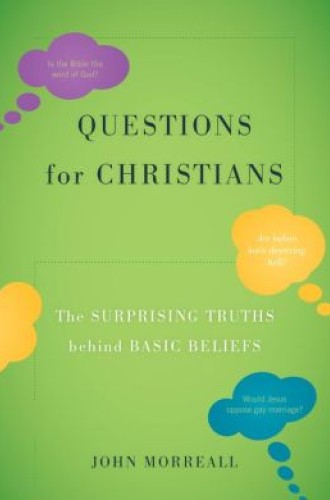Questions for Christians, by John Morreall
Blind acceptance of received religious beliefs and practices leaves one a spiritual infant. Although many people are comfortable living in that state, it’s not spiritually healthy to do so. The risks involved in questioning one’s beliefs and practices are worth taking. To borrow from Anselm, we are well served when faith pursues understanding.
John Morreall, a professor of religious studies at the College of William and Mary, wants Christians to ask questions of their beliefs and practices, following the example of Peter Abelard, who put theological statements to the test in Sic et Non. He envisions his book Questions for Christians as a modern rendition of Abelard’s work. Even though Morreall insists that Jesus did not teach doctrines, but rather offered his followers a way of life, in this book he focuses his attention on the rationality of Christian doctrines and beliefs.
Read our latest issue or browse back issues.
Morreall examines nearly every facet of Christian belief, from the authority and interpretation of scripture to the nature of the church, with chapters examining Christology, the Trinity, the nature of God, the afterlife, and even the existence of angels and demons and whether angels have wings and demons have horns. He checks these varied beliefs against what he believes are the central teachings and practices of Jesus.
To this end Morreall presents ten tenets, beginning with the love ethic, to which he refers throughout the book. If you practice the love ethic, he says, you put “your time and energy into helping people, and trust in God to provide your daily needs.” The remaining tenets relate to the family of God, equality, economics, leadership, festivity, legalism, divine judgment, forgiveness, and pacifism.
Morreall bemoans the influence of Greek philosophy on Christianity and later Constantine’s embrace of the faith, arguing that these two developments moved the church away from the primitive purity of Jesus’ message. With Constantine came councils and creeds, the ascendance of trinitarianism, and a doctrinal system that Morreall finds problematic. There is some truth in his account of the effects of merging church and state, but in his desire to cast doctrinal developments such as the Trinity in a negative light, Morreall links them too closely to the interests of the state.
The intent of the author is commendable. Our belief systems should be marked by clarity, coherence, and credibility, as well as by mystery and humility. However, Morreall’s argument is flawed. What he offers is a liberal version of fundamentalism. The manner of his presentation lacks nuance. In many places he falls victim to the same tendencies for which he criticizes conservatives. Too often he offers an either/or choice: if the ransom theory of the atonement is true, then Anselm’s satisfaction theory must be false. This despite the fact that the biblical materials invite a variety of interpretations of the meaning of the cross.
Morreall accuses the Gospel writers of not being “careful, logical thinkers” because they applied the term messiah to Jesus in a way that was out of line with traditional uses of the word. Why this makes them less than careful in their thinking is not clear. He displays similar narrowness when he discusses formulations of the Trinity by fourth-century theologians such as Athanasius and Gregory of Nyssa, accusing them of constructing “poorly thought-out theories that were then mistranslated several times, until the result was our incoherent English phrase ‘God is three persons in one substance.’” The fact that in the modern era theologians from Barth to Moltmann have continued to work with these categories seems to belie the idea that those earlier theologians’ theories were “poorly thought-out.”
Then there’s Morreall’s use of caricature, as when he gives the impression that conservative thinkers are less than educated. At one point he mentions Billy Graham and Joel Osteen, notes that neither went to seminary, and then writes that “such preachers present their own positions as obviously correct and treat historical and critical discussion as unnecessary.”
In a book that seems to be targeting a general audience, Morreall covers too many topics and does so in a way that will create more walls than bridges. His vision is narrow, his tone is judgmental, and his historical and theological work is often sloppy. The premise is sound, but other books will do a better job of accomplishing the task at hand.







